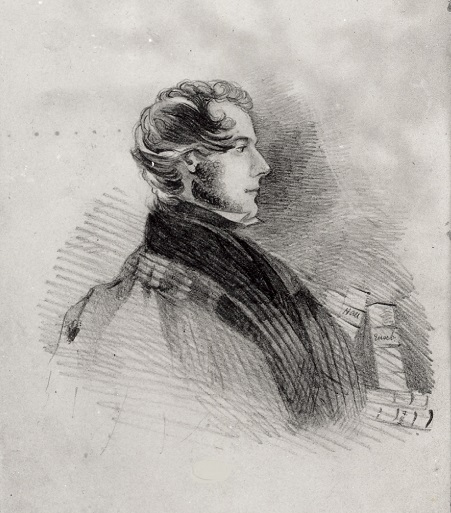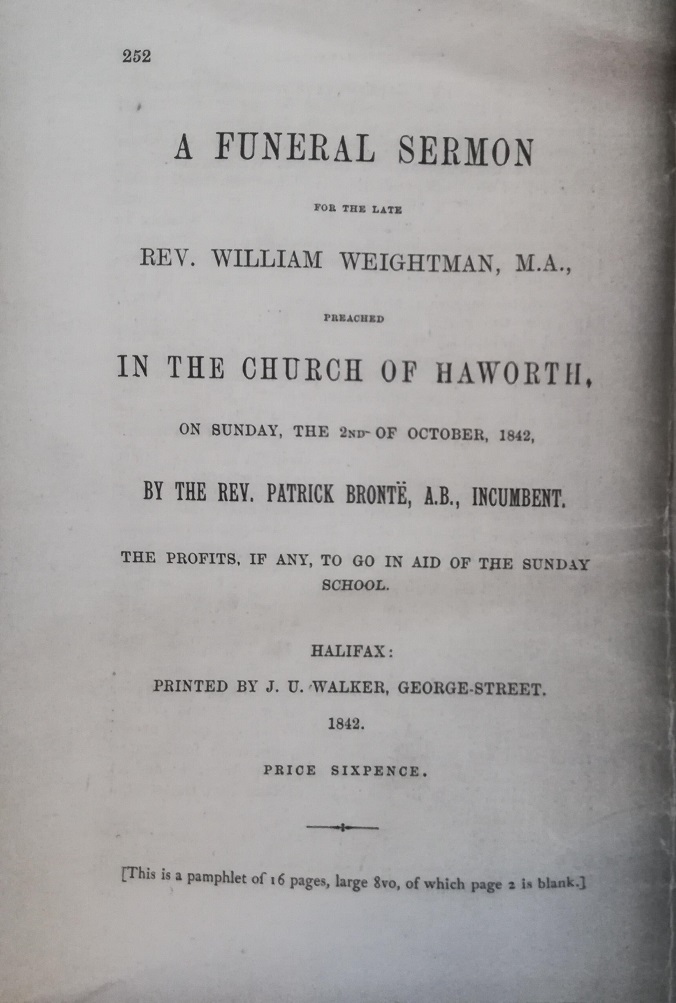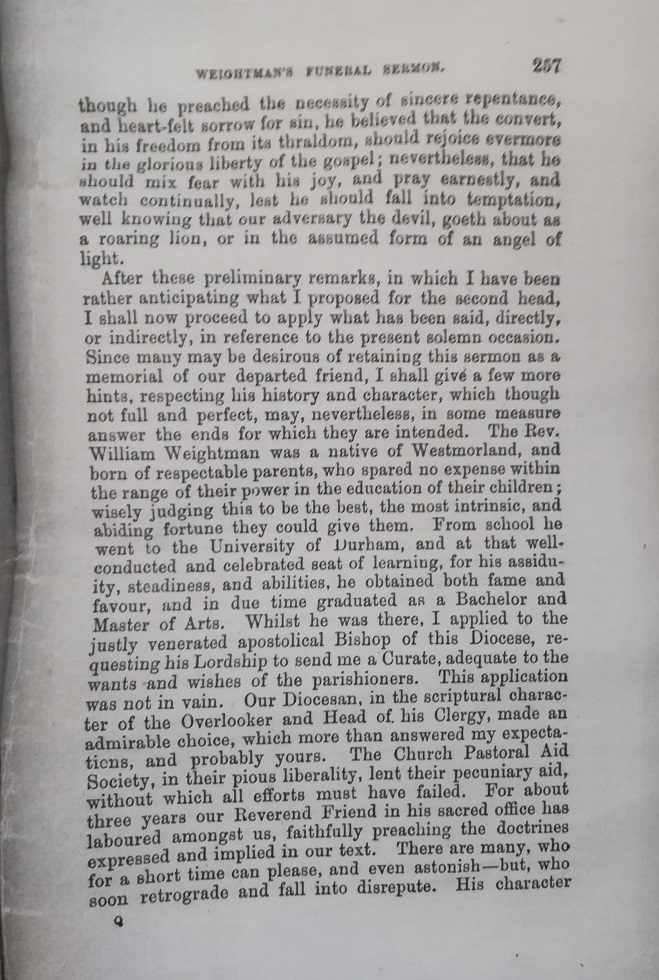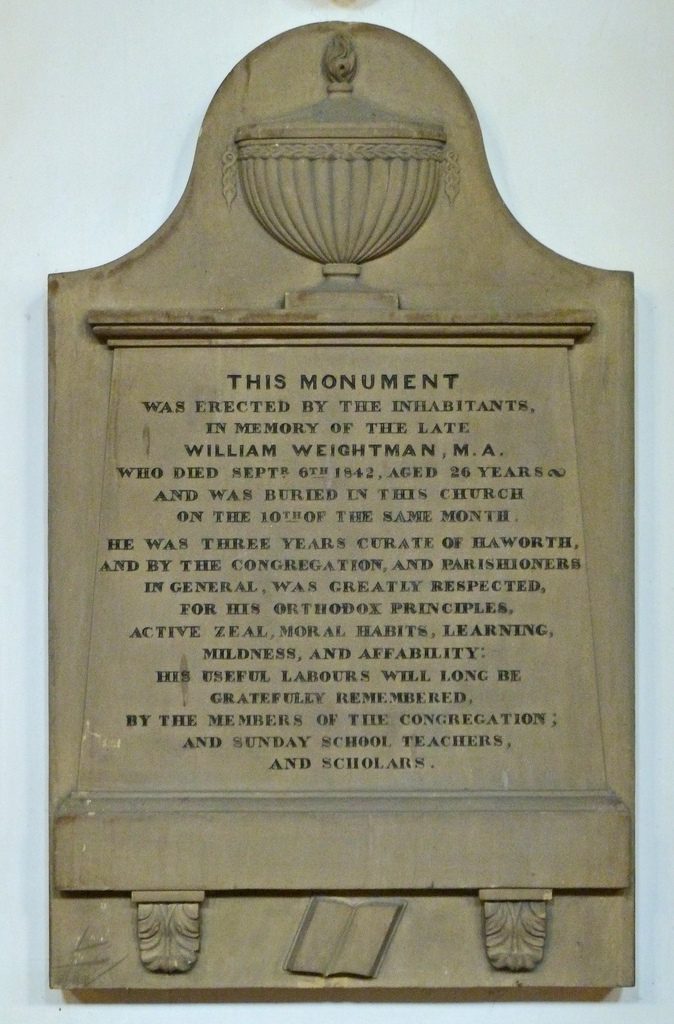This week marks the 177th anniversary of the passing of William Weightman. He died on 6th September 1842, and with his final breath the love of Anne Brontë’s life passed away too. There are some who want only to deal with indisputable facts when dealing with history, but without speculation, without listening to our hearts when the existing evidence is placed before us, we miss out on so much. We see history and historical figures as merely dry cardboard, two dimensional entities, a string of dates and figures, rather than the flesh and blood creatures they really were, ruled by passions and love just as much as we are. It seems clear to me that Anne Brontë was in love with William Weightman, and that she felt his loss greatly throughout her short life.
William was from Appleby in Westmorland (that’s it at the head of this post) and was just 26 when he died, and the nature of his death shows the kind of man he was – he had contracted cholera after visiting a sick parishioner, something he did regularly, sometimes taking them gifts as well to alleviate their want. This trait is also mirrored by Reverend Weston in ‘Agnes Grey‘, and Agnes’ love Weston is really a mirror image of Weightman.

Perhaps the best way to pay tribute to him is to listen to what those who knew him said, including the Brontës:
Charlotte Brontë on William Weightman
[Charlotte’s views on Weightman changed dramatically; she fell under his spell herself but finding her feelings not reciprocated accused him of falseness and christened him ‘Celia Amelia’. Later, however, as this letter to Ellen Nussey shows, she was confronted with his true character]
“There is one little trait respecting him which lately came to my knowledge, which gives a glimpse of the better side of his character. Last Saturday night he had been sitting an hour in the parlour with Papa; and as he went away, I heard Papa say to him – ‘What is the matter with you? You seem in very low spirits tonight.’ ‘Oh, I don’t know. I’ve been to see a poor young girl, who, I’m afraid, is dying.’ ‘Indeed, what is her name?’ ‘Susan Bland, the daughter of John Bland, the superintendent.’ Now Susan Bland is my oldest and best scholar in the Sunday-school; and when I heard that, I thought I would go as soon as I could to see her. I did go, on Monday afternoon, and found her very ill and weak, and seemingly far on her way to that bourne whence no traveller returns. After sitting with her some time, I happened to ask her mother if she thought a little port wine would do her good. She replied that the doctor had recommended it, and that when Mr. Weightman was last there, he had sent them a bottle of wine and a jar of preserves. She added, that he was always good-natured to poor folks, and seemed to have a deal of feeling and kind-heartedness about him. This proves that he is not all selfishness and vanity. No doubt, there are defects in his character, but there are also good qualities. God bless him!”

Branwell Brontë on William Weightman
[Charlotte wrote of how surprised she was that the usually reserved Emily Brontë quickly became friends with William, but he also made an impression on her brother Branwell and they became close companions. His death just days before that of Aunt Branwell dealt a double blow to Branwell Brontë]
“I have had a long attendance at the deathbed of the Rev. William Weightman, one of my dearest friends, and now I am attending at the deathbed of my aunt, who has been for twenty years as my mother. I expect her to die in a few hours… excuse this scrawl, my eyes are too dim with sorrow to see well.”
Patrick Brontë on William Weightman
[Patrick didn’t always get on with his assistant curates, but he was greatly impressed by William from the first. Perhaps if he had one day asked for the hand of a daughter of his, Patrick would have given him a better response than Arthur Bell Nicholls received? Patrick’s love for William can be found in the funeral sermon he preached for him.]

“In his preaching, and practising, he was, as very clergyman ought to be, neither distant nor austere, timid nor obtrusive, nor bigoted, exclusive, nor dogmatical. He was affable, but not familiar; open, but not too confiding. He thought it better, and more scriptural, to make the love of God, rather than the fear of hell, the ruling motive for obedience… For about three years, our Reverend Friend in his sacred office has laboured amongst us, faithfully preaching the doctrines expressed and implied in our text, There are many, who for a short time can please, and even astonish – but, who soon retrograde and fall into disrepute. His character wore well; the surest proof of real worth. He had, it is true, some peculiar advantages. Agreeable in person and manners, and constitutionally cheerful, his first introduction was prepossessing. But what he gained at first, he did not lose afterwards. He had those qualities that enabled him to gain ground. He had classical attainments of the first order, and above all, his religious principles were sound and orthodox… As it ought to be with every Incumbent, and his clerical coadjutor, we were always like father and son… He had the rare art of communicating information with diligence and strictness, without austerity, so as to render instruction, even to the youngest and most giddy, a pleasure, and not a task. The Sunday School Committee, and Teachers, as well as learners, have duly appreciated his talents in this way, and will long remember him with esteem and regret… As he was himself a friend to many, and an enemy to none, so by a kind of reaction, he had, I think I might say, no enemies and many friends… Our late lamented friend ran a bright, but short career. He died in the twenty-sixth year of his age. He had not attained the meridian of man’s life; amidst the joyous, and sanguine anticipations of friends, the good wishes of all, and, as may naturally be supposed, the glad hopes of himself, he was summoned for his removal from this world to the bar of eternity… When good men die early, in the full tide of their usefulness, there is bewildering amazement, till we read in the scriptures, they are taken away from the evil to come. In all such cases, we want faith, and strong faith too.”

The Haworth Parishioners On William Weightman
[The parishioners could be very hard to please, but they loved William, which is why they implored Patrick to publish his funeral sermon, above, and why they collected money to have a plaque raised in his honour. It remains the largest single tribute in Haworth’s church and bears these words:]
“This monument was erected by the inhabitants in memory of the late William Weightman, M.A. who died Sept. 6th 1842, aged 26 years and was buried in this church on the tenth of the same month. He was three years Curate of Haworth and by the congregation and parishioners in general was greatly respected for his orthodox principles, active zeal, moral habits, learning, mildness, and affability. His useful labours will long be gratefully remembered by the members of the congregation; and Sunday School teachers and scholars.”

The Leeds Intelligencer On William Weightman
“He was admired and beloved for his sterling piety, his amiability, and cheerfulness, and the loss of so zealous and useful a Minister of Christ is deeply felt by those among whom he lived and laboured. This discourse [the funeral sermon above], plain and touching in its language, simple yet expressive, pays a well deserved tribute to the memory of the preacher’s beloved and lamented fellow labourer.”
Anne Brontë On William Weightman
We will finish with a tribute to William Weightman from the woman who loved him, and who I believed was loved by him in return – our own beloved Anne Brontë. She not only made him the romantic hero of her first novel ‘Agnes Grey’ she also composed a series of mournful poems for the rest of her life, where the subject is clearly William Weightman. I leave you with just one of these; written in April 1844, ‘A Reminiscence’ marks the poets love for a man who is buried under the cold, damp stone of the church floor. William Weightman was not buried in Haworth’s churchyard, but beneath the floor of the church:
“Yes, thou art gone! and never more
Thy sunny smile shall gladden me;
But I may pass the old church door,
And pace the floor that covers thee,
May stand upon the cold, damp stone,
And think that, frozen, lies below
The lightest heart that I have known,
The kindest I shall ever know.
Yet, though I cannot see thee more,
‘Tis still a comfort to have seen;
And though thy transient life is o’er,
‘Tis sweet to think that thou hast been;
To think a soul so near divine,
Within a form, so angel fair,
United to a heart like thine,
Has gladdened once our humble sphere.”

The sad thing is we don’t know where in the church he’s buried, and because of the reconstruction, probably even more difficult to find or guess.
That’s a good point Bryan – I wonder if the present incumbent Peter Mullins might know, I know he’s been carrying out some research into the church?